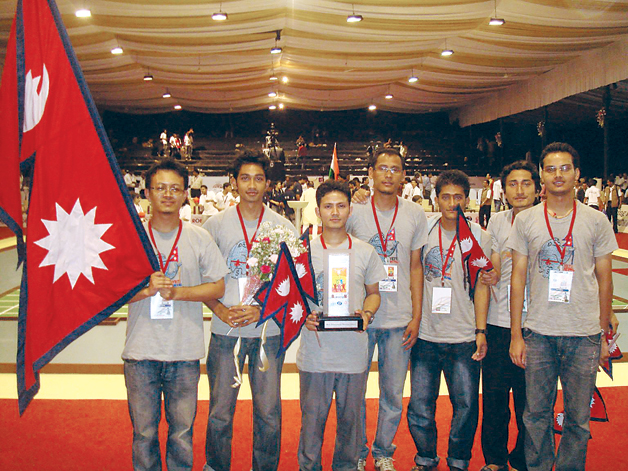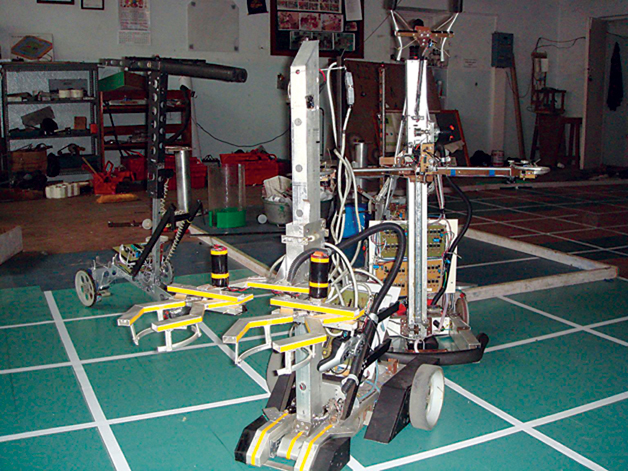
Building a robot was no more than a science fiction, cartoon-induced fantasy by a child in Nepal until about eight years ago when some mechanical and electronic engineering students of the Pulchwok Engneering College established a revolutionary club: ‘PEC Robotics’, coordinated and instructed by Ramesh Chaudari. Robotics engineering is now more than child’s play to the club’s team of 11 extremely talented and devoted engineers.
You feel like you are in a Hollywood science fiction movie, or in a time machine workshop, when you enter the clubhouse. The dark room in which the robotics engineers work takes you into a world quite different from a modern scientist’s workspace, since the PEC students use less of high-tech equipment and components. Look around, and you’ll see what looks like a skeleton of a motor car lying there, something that looks like a space shuttle in the far corner of the room, and a metal plate half cut on a machine.
The workshop leads to another room with a green floor where the robots are tested. That room looks a bit like a tiny golf course, but with angular edges and smooth surface. At the far end of the room is a television set in working condition, which one can assume is the only entertainment apart from a battered old acoustic guitar laying beside it. And all around the room are posters of Robocon, beneath which the achievement of the Nepali team of each year is noted. One says: “Only South Asian Country to Qualify to Quarter Finals”. Another reads: “Wins Mabuchi Motor Award”. One poster shows pictures of an escalator, a cooler, a hybrid car (prototype) and an industrial robot, all built by members of the club.
Doors at the left of the workshop lead to a bedroom and a meeting room. The bedroom, with long low beds, is where the engineers sleep. It’s clear that the place is not a luxury; nor is the meeting room. No wonder they look like places where numerous award winning ideas for the robots were born.
The PEC Robotics Club has limited resources and, at times a short budget, but that does not deter the members. They build robots out of TV and radio components. They spend days and nights, all week, in the workshop with no breaks not even on festival days. It’s not because they need to, but because they want to. The students are either in class or in the workshop all day. It’s their way of life.
The sole purpose of the club is to participate in the Robocon Robot Contest, an annual international competition, which attracts up to 17 participating countries, including Nepal, Japan, Korea and India.
The International Robocon 2008 was held at Maharastra Institute of Technology(MIT) Pune, India on 31st August. Seventeen engineering colleges from 16 countries participated (Bangladesh, China, Egypt, Fiji, Hong Kong, India, Indonesia, Japan, Republic of Korea, Macau, Malaysia, Mongolia, Nepal, Sri Lanka, Thailand and Vietnam). The theme of Robocon 2008 hosted in India was Govinda. Govinda is a traditional Indian deity who used to play earthly games by stealing butter and cheese from the heads of gopis (a cow-herd girl). This was colorfully animated on the field at MIT. The event was broadcast by India’s Doordarshan TV and other members of Asia-pacific Broadcasting Union across the world. The next Robocon International will be held in Japan in August 2009.

At the last Robocon, the PEC students representing Nepal won Second Prize and a prize for the Best Autonomous Machine , a prestigious acknowledgement. It is a great thing to be beating teams from prosperous countries like Japan, since the Nepalese team put together their robot with great hardship on a low budget. “Even the practice arena of the PEC Robotics Club where we test the robots has a poor surface since the green material is expensive,” says Dinesh Twanabasu, the club leader. “We lack a proper budget so we have to use old equipment and parts of appliances. and at times we even have to destroy old robots to make a new one work.”
The eleven club members have this goal – to learn and to build. Each time they learn a new chapter in physics, they apply it to their new robot, so that each new robot is more sophisticated than the last one. The Robocon has a round where sophistication is restricted to a certain degree in terms of use of components. It is a plus point for the Nepalese team because every day in the workshop they face restrictions and limitations. “It is very difficult to get robotic equipment and components, so that we often have to substitute a part with something else, or build a part from scratch, or ship it in from somewhere else. This has helped us in terms of creativity, however,” says Dinesh. After all, limitations induce creativity and need induces invention.
“We rarely go home,” he says. “We sleep in the workshop itself. Building robots is what we do all day and it is what we ponder all night.”
The awards that the club has won through the years at Robocon prove the team’s devotion, and eight years of togetherness proves their like-mindedness. “We were the first in Nepal to start a Robotics Club; but they are all over the place now. Engineering colleges now boast on the fact that they have one,” he adds. “We don’t do that, though we have one of the best clubs in the country. And what is amazing is that our boys don’t have a clue about the outside world, nor does the outside world know much about us. People who build something really simple are in the media everywhere, things that are way less complicated and innovative than what our members produce.”
The satisfaction of learning and the pride of holding their country up is all they get out of it. But still they are strong and show no signs of slowing down. Other than the prizes, they have yet another great achievement—they have been successfully organizing robotics competition nationally. They’ve done this for four years, encouraging other engineering colleges to take part and make advances in robotics engineering. Until recently, this was a neglected field in Nepal. Now many engineering colleges around Nepal take pride in mentioning their robotics club in college brochures. All the credit goes to the robotics pioneers of Nepal: the PEC Robotics Club, as groundbreakers who have influenced a whole generation of Nepali student engineers.










